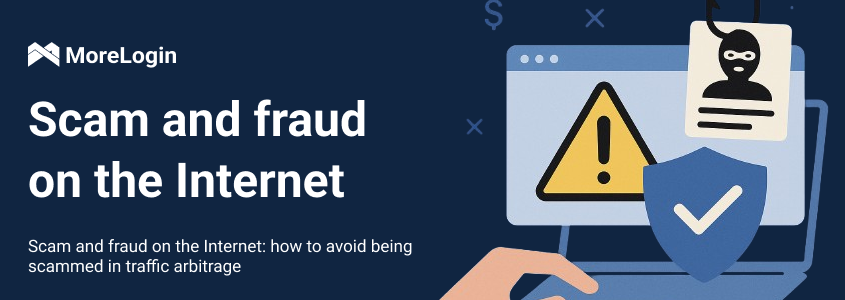
- Product

- Pricing
- Affiliate Program
- Use Cases
- Resource


In 2025, scams in traffic arbitrage have become more common than ever. Many beginners lose money because they fall for big promises of easy earnings with little effort. This article explains how CPA fraud works, highlights common traps for newcomers, and gives practical advice on how to spot scam offers.
How to identify fake offers
Where to look to avoid getting scammed
How to find real reviews about CPA networks
What actions to take if you have already been scammed
Clear and concise. Let’s dive in.
Scams in traffic arbitrage are fraudulent schemes in which criminals lure webmasters with promises of high profits, only to avoid paying or to misuse their data. These scams thrive in competitive environments where beginners look for fast success.
Many fall for "exclusive leaks," "secret strategies," or extremely high payouts without verifying the details. The desire for quick money clouds their judgment. In 2025, AI-generated fake reviews and bot support make scams more convincing than ever. Losses now exceed billions of dollars in niches like gambling, nutra, and crypto.
Success in arbitrage requires not only skills but also caution. A single mistake can cost thousands of dollars. Beginners often ignore red flags such as a lack of transparency or overly perfect offers, which leads to financial loss and disappointment. Developing critical thinking and verifying sources is key to avoiding scams.
In 2025, scams have evolved and now target mobile apps and social networks. Fraudsters use bots for fake support, generate AI-based testimonials, and focus on crypto offers with false promises of stablecoin payouts. Many operate via Telegram or Discord, offering “exclusive” private cases for payment, often containing outdated information.
Losses from such scams have risen 35% according to CPA.ru, especially in mobile traffic, casino, and nutra niches. AI is now used to create personalized traps that mimic real affiliate campaigns. Beginners unfamiliar with these advancements face greater risks than ever.
To stay safe, follow updates in trusted communities and review the latest scam reports.
These promises include huge payouts per lead, but payouts never arrive. Traffic gets redirected or filtered as “junk,” and ad accounts may get banned.
To protect yourself: compare offer rates, check their rotation, and always test with a small budget first.
They look professional but ban users after you accumulate $100–200 or delay payouts. Some shave leads and pass them to others.
To detect fraud: check the site’s history, read user reviews, verify contact details, start with small amounts, and talk to real webmasters.
Fraudsters sell “resources” like browsers or proxies that don’t work. These are often pitched by fake teams in community chats.
Stick to trusted providers like MoreLogin and SmartProxy to avoid wasting money.
You may be invited to drive traffic to phishing pages or illegal content with high payouts. This can lead to legal trouble globally.
Never accept such tasks without understanding the legal risks.
Scammers often repackage old strategies and sell them as new. Once paid, they disappear. These courses usually ignore the latest platform updates.
Always evaluate the credibility of the seller and check if the method is still relevant.
Learn to recognize red flags: inflated payouts, overly simple terms, missing contact details, and suspicious reviews. Scammers often use urgency to pressure you. Always research offers, test on a budget, and use secure tools like MoreLogin and SmartProxy. Track your stats and conversations for evidence.
Use trusted sources for research: forums like TrafLab, CPA.ru, ForbesArb, Telegram communities, and review platforms like TrustPilot, SiteJabber, Affise, and Everad. Ask experienced affiliates for advice.
If you’ve been scammed: stop running traffic, gather all proof, report the fraud, warn others, and request a chargeback through PayPal or your bank. For large amounts, consult a lawyer. Fast action reduces damage and helps others avoid the same trap.
MoreLogin is an anti-detect browser that encrypts your data, separates browser profiles, and allows you to test offers without account bans. You can buy proxies securely, store information locally, and bypass risky third-party sources through verified integrations. It helps you stay safe while focusing on your campaigns.
Arbitrage is a profession where security matters more than excitement. Start with small budgets and trusted networks. Don’t chase high payouts without verification.
Always follow these rules: verify, test, seek advice. Use reliable tools and keep your expectations realistic. In 2025, with advanced scams powered by AI, vigilance is the key to success.
Real opportunities require real effort. Avoid shortcuts, stay alert, and build a sustainable business in the ever-changing world of traffic arbitrage.